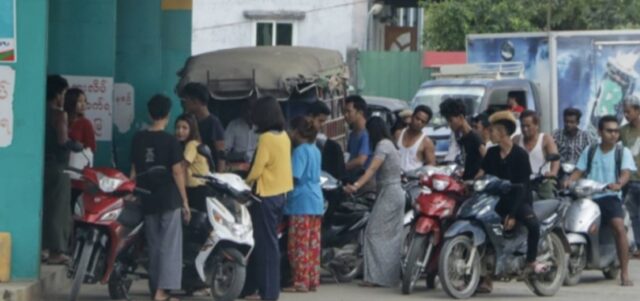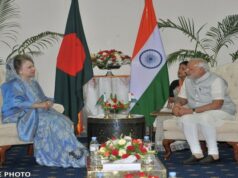Amid serious fuel shortages and price hikes across Myanmar, businesses say they will soon halt operations unless availability improves.
Thanks to the regime’s foreign currency controls and the restricted supply of fuel, it is becoming increasingly difficult to buy gasoline and diesel with prices exceeding 2,000 kyats per litre.
A garment factory owner from Hlaing Tharyar in Yangon said: “Industrial zones that do not have access to 24-hour electricity are struggling. They need fuel to operate and their daily demand for diesel is huge. If we can’t buy fuel, we must close.”
“At my factory, some buses couldn’t run on Saturday as they didn’t have fuel. Many factories will have to halt operations within three days,” he added.
Many factories rely on generators because of limited electricity supplies and the entire supply chain could come to a halt, he said.
As the regime has banned factories from buying fuel by the barrel at filling stations, they are supplied by small bowsers at fixed prices plus transport charges. Sellers said their stocks are running out.
Junta spokesman Major General Zaw Min Tun told the media on Monday that Myanmar has 60,000 tons of fuel in stock and more oil tankers are being emptied soon.
But on the ground gas stations are selling by quotas and it is difficult to buy fuel after 10 am in Yangon.
The prices set by the regime’s supervisory committee in Yangon are 2,320 kyats per litre of 92 Ron octane, 2,390 kyats for 95 Ron octane and 2,730 kyats for diesel.
On Monday, the regime said it would target filling stations in Yangon that are selling on a quota basis.
A fuel wholesaler said: “What can we do? They will arrest us or revoke our licenses. The SAC [State Administration Council] can’t give us fuel. We have no stocks. We still have to queue at Thilawa [port] to resupply. It’s not just Yangon, some filling stations have closed in Mandalay.”
Kachin, Karen, Mon and Shan states and Tanintharyi, Sagaing and Magwe regions are also facing shortages. Only 92 Ron octane is widely available and being sold at 2,400 kyats. Many filling stations have closed.
Drivers outside Yangon have to buy fuel at higher rates than the regime’s fixed prices and supplies do not meet demand, according to distributors.
Taxi drivers have been hit by the fuel crisis and restaurants are struggling.
A restaurateur in Yangon said: “Consumers are spending less due to high prices. Car owners do not come because fuel is scarce. Customers are not using taxis as fares have increased. We rely on fuel for refrigeration because of power outages.”
(By arrangement with ‘The Irrawaddy’)





